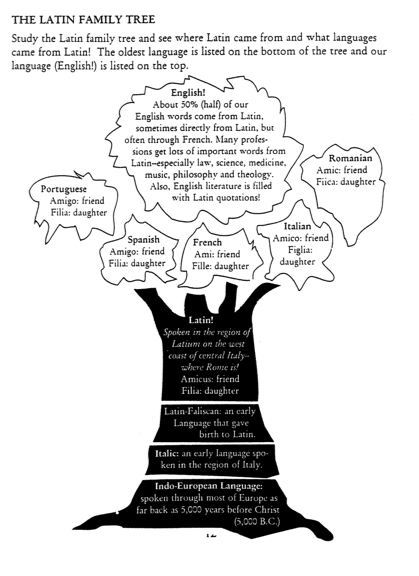Is Latin a “dead” language? People usually study Spanish or German or Italian or French. These languages belong to a land or people who use them to communicate every day. But, who communicates with Latin every day? What land or people does it belong to? If no one speaks Latin then WHY do we bother to learn it?
1. Learning Latin makes it easier to learn other languages. Many languages have their roots in Latin. The 5 Romance Languages are direct descendants of Latin and one can learn them more easily once you know Latin.

Italian (Italy)
Spanish (Spain, Mexico)
French (France, Canada)
Romanian (Romania)
Portuguese (Portugal, Brazil)
2. Learning Latin increases our English vocabulary. The more Latin words you know, the more English words you know! More than 60% of our words derive from Latin.
3. Learning Latin improves our accurate and effective use of English. Not only will we have access to more words, but we will also have a better understanding of the meaning of words! We will use them more intelligently. We will be better thinkers, writers and speakers! Latin makes you smarter!!!
4. Learning Latin helps us bear/reflect God’s image. The Father, Son and Holy Spirit communicate with one another through words, language. The very first conversation in the Scriptures takes place between Father, Son & Holy Spirit: ”Let Us make man in Our image . . .” Because we are created in His image, we are to be communicators after His image.
God communicates with us through words/language. He spoke to Adam & Eve using words, not feelings or telepathy! God continues to speak to us by means of words…the written Word of God and the Living Word, Christ.
God commanded us to subdue all of creation. He told Adam & Eve to serve and guard the garden and to take dominion over all the earth. We are to take dominion over invisible parts of creation (such as words, language, thoughts and ideas) as well as physical creation.
So, in summary, learning Latin helps us achieve the understanding needed to use words in a meaningful and glorious way, so that we may reflect God’s image more truly.
— The above information is gleaned from my sister-in-law’s Latin classroom instruction, which I couldn’t have said better myself! —
Interested in taking a “live, interactive” online Latin class? Take the POLL here!


